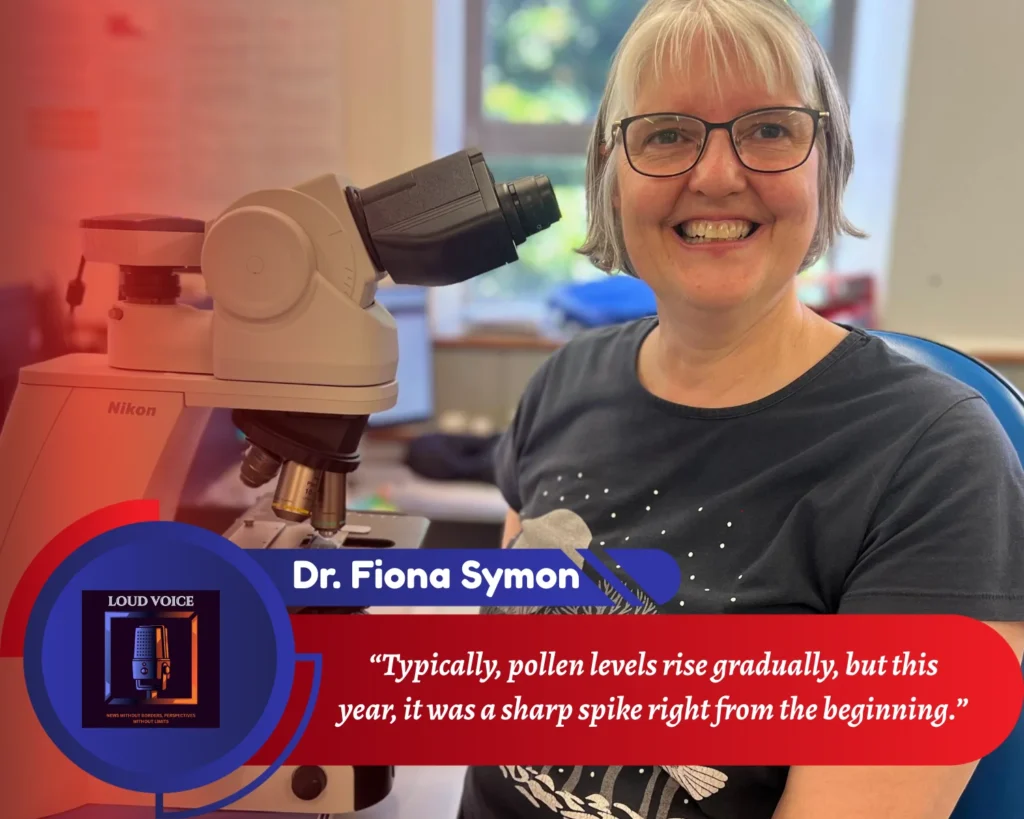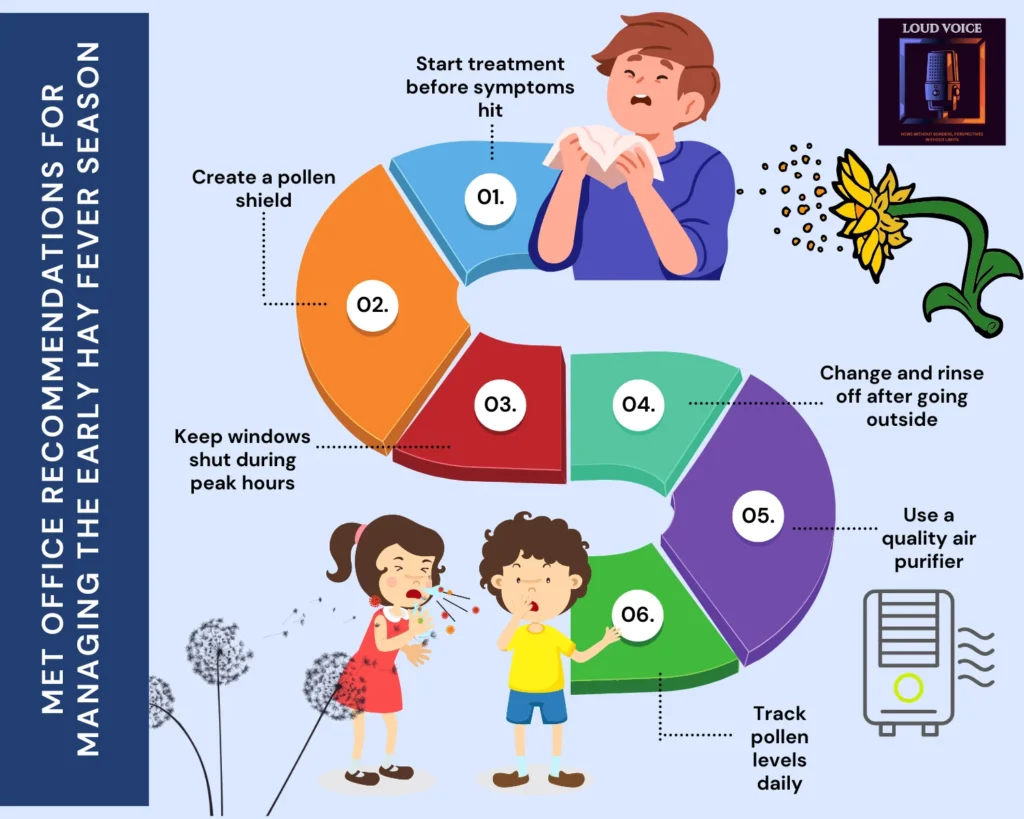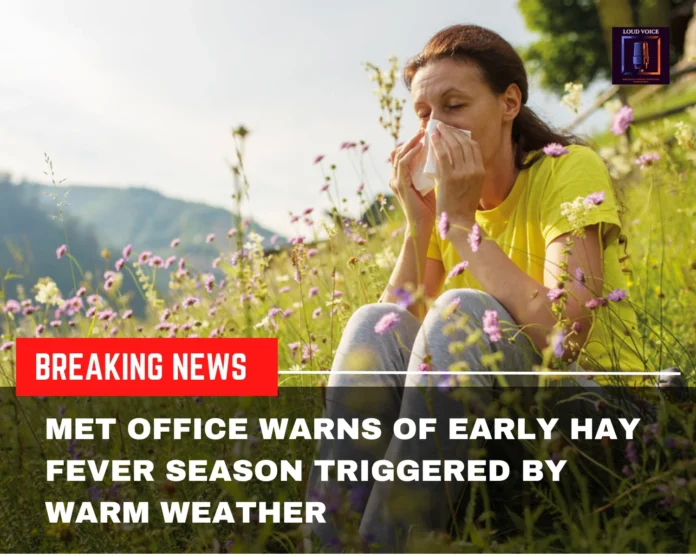Met Office Warns of Early Hay Fever Season: Introduction
If you’ve found yourself sneezing a little more than usual lately, it’s not your imagination — it’s allergy season, and it’s arrived early this year. According to the Met Office, an early hay fever season is in full swing across parts of the UK, triggered by an unusual spell of warm and breezy weather that accelerated tree pollen release.
And for millions of hay fever sufferers, that means symptoms like itchy eyes, runny noses, and persistent sneezing are showing up weeks ahead of schedule.
Cutting-Edge Tech Confirms Spike in Pollen Levels
A significant advancement in pollen tracking technology is at the heart of this early warning. Using the Swisens Poleno Jupiter, a sophisticated, real-time pollen analysis tool, Dr. Fiona Symon, a respiratory science specialist at the University of Leicester, has been monitoring pollen levels.
“Traditionally, we had to collect air samples and study them under microscopes — a process that took days,” explains Dr. Symon. “Now, the Poleno gives us immediate results, helping us act quickly.”
Leicester was one of the first cities in England to install this Swiss-designed machine in 2024, and it’s already proving its worth. It automatically identifies pollen types in real time, replacing tedious manual methods and offering instant data to institutions like the Met Office, which uses the information to issue public alerts.
Warm Weather Fuels High Birch and Hornbeam Pollen Release
So, what caused the Met Office’s early hay fever season announcement? In short — the weather.
The first week of April brought sunny days, warm temperatures, and just enough wind to stir up trouble. These conditions created the perfect storm for tree pollination, particularly from birch and hornbeam — two major culprits in springtime allergies.
“We recorded very high levels of birch pollen between April 1st and 7th,” says Dr. Symon. “Typically, pollen levels rise gradually, but this year, it was a sharp spike right from the beginning.”

Birch pollen is especially notorious for triggering hay fever symptoms, and when combined with hornbeam — a close botanical relative with similar allergens — it can lead to intense reactions in sensitive individuals.
Pollen Lingers Late Into the Night
Another concern? Pollen isn’t just a daytime problem this year.
Thanks to milder night temperatures, the Poleno device picked up significant levels of airborne pollen well into the early morning hours — in some cases, as late as 3 AM.
“Usually, we expect pollen counts to drop off after sunset,” Dr. Symon explains. “But on warmer nights like April 4th and 5th, the levels stayed unusually high. That’s bad news for people who think keeping windows open at night is a safe bet.”
Met Office Recommendations for Managing the Early Hay Fever Season
As the Met Office sounds the alarm on an unusually early hay fever season, allergy experts are strongly advising people to get ahead of their symptoms now—before things spiral out of control. Getting a jump start can make a world of difference. Here are some smart and easy ways to stay on top of your hay fever this spring:
- Start treatment before symptoms hit: Don’t wait until you’re sneezing nonstop—get those antihistamines, nasal sprays, or allergy eye drops into your daily routine right away.
- Create a pollen shield: Dab a bit of petroleum jelly just inside your nostrils to catch pollen particles before they make their way into your system.
- Keep windows shut during peak hours: Pollen counts tend to spike early in the morning and at dusk, so keeping windows closed can keep your home a safe zone.
- Change and rinse off after going outside: Pollen clings to your clothes, hair, and skin. A quick shower and outfit change can stop it from following you indoors.
- Use a quality air purifier: Devices with HEPA filters are excellent for clearing pollen and other allergens from the air in your home.
- Track pollen levels daily: The Met Office provides up-to-date pollen forecasts, which are invaluable for planning outdoor time and avoiding high-risk periods.

“Getting ahead of your symptoms is key,” advises Dr. Symon. “You don’t have to suffer through it if you start protecting yourself early.”
Real-Time Data Powers Better Public Warnings
Thanks to the University of Leicester’s new monitoring system, the Met Office can now deliver more timely and accurate pollen forecasts. This not only helps allergy sufferers plan their days but also supports healthcare providers in managing asthma and allergy-related complications more effectively.
“Before, there was always a lag between what was happening in the air and when we could report it,” Dr. Symon says. “Now, we’re getting real-time data that allows us to warn the public almost instantly.”
These developments may also open the door for a wider implementation of comparable technologies throughout the United Kingdom, which is crucial for public health in the era of climate uncertainty, according to Dr. Symon.
Why This Early Hay Fever Season Could Be Worse Than Usual
What makes this year’s early season especially troubling is the intensity of the pollen release. Unlike previous years where tree pollen slowly built up over weeks, 2025 has seen a burst of high levels from the start — which means more people are experiencing stronger reactions earlier.
“This is likely to be a heavy birch pollen year,” says Dr. Symon. “And for people already prone to allergies, that’s a real concern.”
Furthermore, longer and more intense seasons may become the new norm. Climate change is believed to be playing a role, with rising temperatures and shifting weather patterns contributing to early and extended pollen seasons across Europe.
Leicester Leads the Way in National Monitoring
The University of Leicester’s contribution isn’t just helping the local population — it’s influencing national forecasts. All of the data gathered by their real-time monitors is fed directly to the Met Office, which then updates its national pollen count maps and forecasts.
This kind of collaboration between academic research and public services is a shining example of how innovation can directly impact public well-being.
“We’re proud that our research is making a difference,” Dr. Symon concludes. “It’s about giving people the tools they need to manage their health, especially during peak allergy seasons.”
Conclusion: Be Prepared, Stay Informed, Breathe Easier
With the Met Office officially confirming an early hay fever season, now’s the time to take action. Whether it’s starting your medications early, checking daily pollen forecasts, or making small changes to your daily routine, being proactive can spare you a season of misery.
Real-time monitoring, advanced forecasting tools, and expert guidance are helping the UK face this seasonal challenge head-on. So don’t wait — take a deep breath (through your nose balm), and face this pollen-packed season with confidence. Because when it comes to hay fever, early awareness is your best defense.


